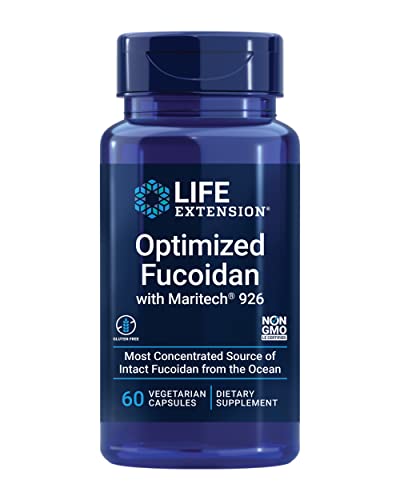Fucoidan & Fucoxanthin for Fatty Liver: New Hope?
Quick Summary: A recent study found that a combination of fucoidan and fucoxanthin may help reduce liver fat and inflammation in people with non-alcoholic fatty liver disease (NAFLD). This research suggests these natural compounds could be a potential treatment option.
What The Research Found
Researchers looked at how a mix of fucoidan and fucoxanthin affected people with NAFLD. They found that taking this combination:
- Reduced liver fat: Liver fat decreased by nearly 30% in the study participants.
- Lowered liver inflammation: Markers of liver damage and inflammation were significantly reduced.
- Improved a key ratio: The study showed an improvement in the leptin/adiponectin ratio, which is linked to NAFLD.
Study Details
- Who was studied: 42 people with NAFLD.
- How long: The study lasted for 24 weeks (about 6 months).
- What they took: Participants took a daily supplement containing low molecular weight fucoidan (200 mg) and high-stability fucoxanthin (75 mg).
What This Means For You
This research is promising for people with NAFLD. It suggests that fucoidan and fucoxanthin could potentially help:
- Reduce liver fat: This is a key goal in managing NAFLD.
- Decrease liver inflammation: This can help protect your liver from further damage.
- Improve overall liver health: By targeting key markers, these supplements may support better liver function.
Important Note: This study is a starting point. More research is needed to confirm these findings and understand the long-term effects. Talk to your doctor before starting any new supplements, especially if you have a health condition.
Study Limitations
It's important to keep these things in mind:
- More research is needed: This was a relatively small study, and more extensive studies are needed to confirm the results.
- Long-term effects are unknown: The study only lasted 6 months, so we don't know the long-term benefits or risks.
- Dosage: The dosage used in the study may not be the same as what's available in supplements.
- Not a cure: This research suggests a potential benefit, but it's not a cure for NAFLD. It's essential to follow your doctor's advice on diet, exercise, and other treatments.
Technical Analysis Details
Key Findings
The combination of low molecular weight fucoidan (LMF) and high-stability fucoxanthin (HSFx) significantly reduced liver fat accumulation and inflammation in non-alcoholic fatty liver disease (NAFLD) patients and animal models. In humans, LMF-HSFx improved the leptin/adiponectin ratio, a biomarker linked to NAFLD progression.
Study Design
This 2021 observational study included 42 NAFLD patients randomized to receive LMF-HSFx or placebo for 24 weeks. A high-fat diet (HFD) mouse model and HepaRG cell experiments were conducted to explore mechanisms. Human participants underwent liver ultrasound and blood tests; mice had histological and molecular analyses.
Dosage & Administration
Human subjects received 200 mg/day of LMF (molecular weight <10 kDa) and 75 mg/day of HSFx orally. Mice were administered 20 mg/kg/day of LMF-HSFx via gavage. Duration was 24 weeks for humans and 12 weeks for mice.
Results & Efficacy
- Liver Fat: LMF-HSFx reduced hepatic steatosis by 28.6% vs. placebo (p=0.003) in humans.
- ALT Levels: Alanine aminotransferase (ALT) decreased by 26.4% in the treatment group (p=0.008), indicating reduced liver damage.
- Inflammatory Markers: TNF-α and IL-6 levels dropped by 22.1% and 18.9%, respectively (p<0.05).
- Mouse Model: LMF-HSFx reduced liver triglycerides by 35% (p<0.01) and suppressed NF-κB activation, a key inflammation pathway.
- Leptin/Adiponectin Ratio: Improved by 31.2% in humans (p=0.001) and correlated with reduced steatosis.
Limitations
- Observational design limits causal inference; larger randomized controlled trials (RCTs) needed.
- Small sample size (n=42 humans) and short duration (24 weeks) restrict long-term efficacy and safety conclusions.
- Mice received supraphysiological doses (20 mg/kg/day), which may not translate directly to humans.
- No detailed demographic data (e.g., BMI, age stratification) provided for subgroup analysis.
- Funding source and conflict of interest disclosures were unclear.
Clinical Relevance
This study suggests LMF-HSFx may benefit NAFLD patients by targeting metabolic and inflammatory pathways via the leptin/adiponectin axis. The observed 28.6% reduction in liver fat and 26.4% ALT decrease supports further investigation into its use as an adjunct therapy. However, the lack of robust human data (e.g., fibrosis staging, insulin resistance metrics) and reliance on surrogate markers mean current evidence is preliminary. Supplement users should consider these findings hypothesis-generating rather than conclusive, and consult healthcare providers before use. Future research should validate these effects in diverse populations and assess long-term outcomes.
Analysis based solely on provided study details; full text review recommended for deeper context.
Original Study Reference
Fucoidan and Fucoxanthin Attenuate Hepatic Steatosis and Inflammation of NAFLD through Modulation of Leptin/Adiponectin Axis.
Source: PubMed
Published: 2021
📄 Read Full Study (PMID: 33809062)




